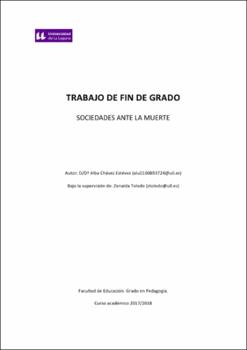Sociedades ante la muerte
Author
Chávez Estévez, AlbaDate
2018Abstract
La muerte es un proceso que ha acompañado al ser humano a lo largo de la historia. Esta ha dejado de estar presente a medida que ha evolucionado históricamente nuestro país, influyendo directamente en las conductas de los adultos y de los/as más pequeños/as. Por lo tanto, esto tiene un impacto negativo en la sociedad ya que han ido desapareciendo conductas como el acompañamiento del fallecido, el respeto a algunas costumbres, la naturalidad de la temática, etc. A través de la sensibilización del profesorado de Primaria se podría llegar a un gran número de personas y, además, los/as menores serían los principales afectados/as en las aulas. La eliminación de los tabúes conforme a la muerte conllevaría a que todo lo que se incluye dentro de ella (factores psicológicos, factores culturales, etc.) no se desvinculen de la sociedad, se traten con normalidad y trasparencia, y no provoquen frustraciones e inquietudes colectivas. Death is a process that has accompanied the human being throughout history. This has ceased to be present as our country has historically evolved and has a direct influence on the behaviors of adults and the youngest. Therefore, this has a negative impact on society since behaviors such as the accompaniment of the deceased, respect for some customs, the naturalness of the theme, etc. have been disappearing. Through the sensitization of Primary teachers, a large number of people could be reached and, in addition, the minors would be the main beneficiaries in the classrooms. The elimination of taboos regarding to death would help to prevent everything that is included within it (psychological factors, cultural factors, etc.) from being dissociated from society, and to approach it with normality and transparency, without causing frustrations and collective concerns.





